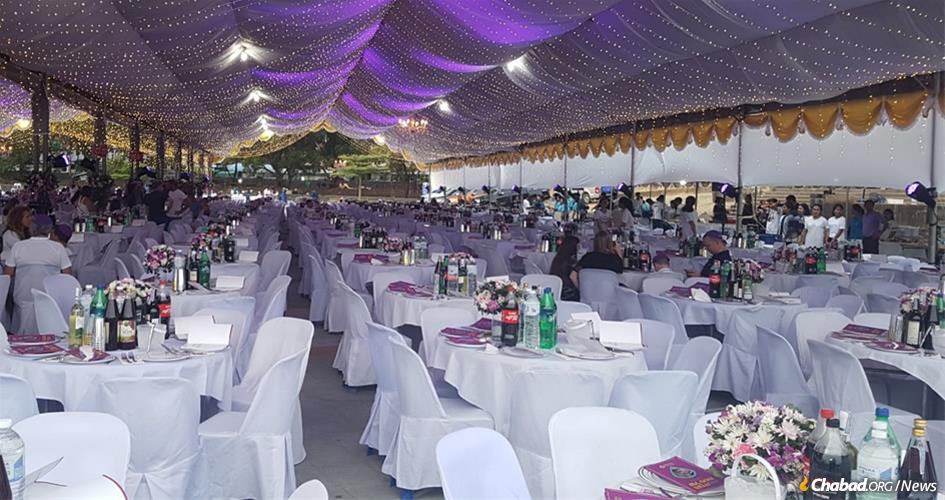Koh Samui giving Kathmandu a friendly run for biggest crowd of matzah-eaters
Nepal’s world-famous Passover Seder, held annually high in the Himalayas in the capital city of Kathmandu, reaching a peak of some 2,000 guests last year on its 30th anniversary, stands as a perpetual icon of Chabad-Lubavitch’s “no mountain too tall to climb” approach to Jewish education and outreach.
Well, a few countries to the southeast and a sea away in Thailand on the island of Koh Samui, the annual mega-affair in Kathmandu, commonly dubbed “The World’s Largest Seder,” now has company—lots of company.
Despite it being so close to Passover, Chabad.org caught up with the busy organizer of a Seder planned for the exotic island getaway, Koh Samui, that is threatening to outstrip Kathmandu’s numbers by as many as 1,000 guests this year. “Yes in fact we are looking forward with much excitement to yet another great experience with even more people this year,” said Rabbi Mendel Goldshmid, who co-directs the Koh Samui Chabad-Lubavitch organization and its Seders with his wife, Sara.
Taking a break for the call amid some intense negotiations with a new vendor for his Seder signs and flyers, Goldshmid added: “We are planning new features this year such as a separate Seder in English in addition to our usual large Seder in Hebrew as the majority of our guests come from Israel. The whole affair is the high point of our year.”
Last year, one of his three Seders—three of 14 total held in the tropical Southeast Asian nation—was already in the 2,500-guest range.
Still, in the end, all agree that when it comes to the numbers, who’s really counting? Chabad’s Asian Seder sprawl—from Nepal to Thailand to Cambodia to China—and elsewhere in the world is being produced by one big happy family with a common vision.
Whether in Kathmandu, Bangkok or the other countless places internationally where sizeable public Seders are produced by the movement’s emissaries, the goal is the same: “Increasing Jewish participation, education and unity,” said Rabbi YosefChaim Kantor, Thailand’s chief rabbi and the country’s head Chabad-Lubavitch emissary, who himself holds a large community Seder for English speakers in Bangkok.
Rabbi Chaim Eliezer Ashkenazi, administrator and logistics chief of Chabad of Thailand, who runs the Bangkok community Hebrew Seder, said sizeable numbers add to the unity, but also add to the “awe and splendor” of the annual celebrations.
Rabbi Mendel and Sara Goldshmid and family welcome guests to last year’s Seder.
Members of the Wiener family—Brian, wife Lauren and adult children, Aviya and Asher—made the more than nine-hour flight from Melbourne to attend one of the Koh Samui Seders—not once but twice in the last 14 years, including last year.
“Fourteen years ago, we thought that 400 people in an outdoor plaza was unreal, but last year, with more than 2,000 people under a huge marquee, now that was unreal,” related Brian Wiener, a jewelry and diamond dealer whose work takes him across Asia and to Chabad centers regularly. “The dedication of the emissaries in Thailand, India, Nepal, Cambodia, China and Hong Kong is something to be marveled at. Every single one of these wonderfully dedicated people is a treasure.”
A 2017 celebrant at one of Bangkok’s Seders, Daniel Groffman, also of Melbourne, posted in its immediate aftermath: “I experienced the largest, most enthusiastic, enjoyable, spiritual, best Passover Seder ever in Bangkok, Thailand. So many people singing. Great atmosphere. Maybe 400 people from not only Thailand but around the world—France, USA, Venezuela, Israel, Australia, etc.”
Preparing for one of a number of large communal Seders in Bangkok, Thailand.
The Unifying Experience of Large Public Seders
After two decades holding Seders that are also part of the growing array of Thailand’s communal gatherings, Rabbi Nechemya Wilhelm, who has directed Bangkok’s Chabad traveler’s center for the past 24 years with his wife, Nechami, remains awed by the experience.
“There is a place for personal Seders, but there is a special power to being with so many people, especially Jews from across the spectrum,” said Wilhelm, who will accommodate about 1,200 guests this year in his usual mix of barely religious and more observant Jews together at Seders in his Chabad center and at a hotel across the street. “You can’t imagine the feeling when 200 children go up to the stage and say the “Mah Nishtanah”[“Four Questions”] together or when 800 men sing [Passover favorite] “Echad Mi Yodea?” [“Who Knows One?”] together. It is a unifying energy that is hard to describe. The feeling I get in particular when I look across the room at the very large crowd sitting together—haredim [very religious Jews] with mostly non-practicing Jews—is unimaginable.”
Wilhelm, Goldschmid and their wives are not foreigners to serving large numbers, as both organizations annually field a total of some 150,000 visitors, providing material and spiritual nourishment to an average of 300 to 500 Shabbat guests per week. Patrons of their services are mostly tourists and business travelers, as the local community of Jews is only a few thousand-strong in Bangkok and between 100 to 200 on Koh Samui.
Outside of Bangkok, in addition to Koh Samui, large public Seders are planned this year for Chiang Mai, Phuket, in neighboring Laos under Thailand’s direction, and Pai, a Thai city being added this year for the first time.
